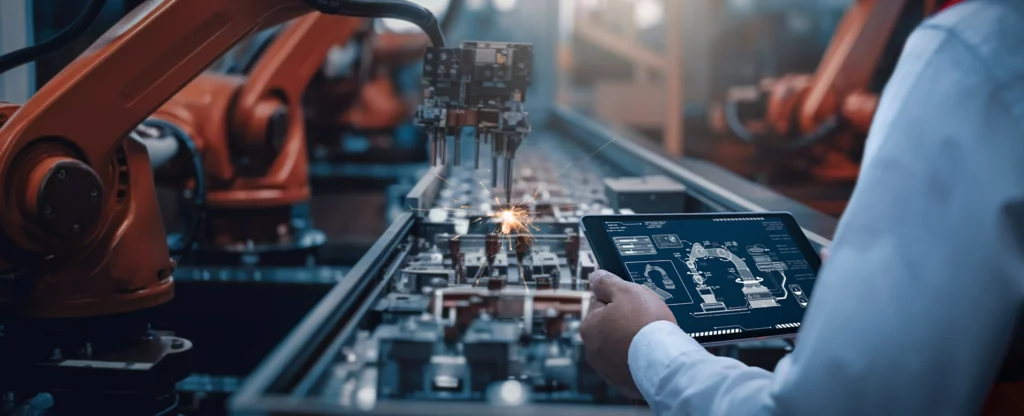With 93% of manufacturing companies believing that AI will drive growth and innovation, the sector’s investment in this technology is booming. The market value for AI in the industrial machinery sector is expected to skyrocket to $20 BN with a CAGR of over 25% between 2023-2032, highlighting the significant role of AI in industrial production.
Artificial Intelligence (AI) is pivotal in propelling the manufacturing sector toward its operational and innovative goals. Notably, 66% of industrial manufacturers foresee AI and Machine Learning (ML) as key to their short-term ambitions, as per KPMG, with McKinsey’s analysis predicting a potential productivity increase valued between $740 billion and $1.34 trillion thanks to AI.
Industrial manufacturers could benefit considerably from leveraging AI for process optimization, enhanced efficiency, and quality control. As we delve deeper into the current trends and developments within the industry, let’s explore how AI is paving the way for a new era of innovation and productivity in manufacturing.
Current Trends and Potential Uses for AI in Manufacturing
The goal of using AI in manufacturing is to make every part of the production process smarter and more responsive. Here are some of the most common scenarios where AI is already helping.
Predictive maintenance and systems monitoring
Predictive maintenance is a prime example of AI’s utility in manufacturing. Through detailed sensor data analysis and machine performance metrics, AI algorithms can predict wear and tear, facilitating preemptive maintenance actions. This predictive capability significantly reduces machine downtime and consequent productivity losses. Moreover, AI-enabled machines can autonomously adjust operational parameters in real-time in response to internal or external signals, enhancing efficiency and reducing environmental impact through smarter resource usage.
Product design and R&D
Traditional and generative AI is already used for experiments in product development. Companies can simulate and test designs in virtual environments by creating digital twins. This approach allows the modification of design parameters and exploration of various scenarios, speeding up the research process and facilitating extensive customization. Consequently, it is easier to achieve the optimal product design and thus speed up production. In addition, AI’s analysis of data from IoT devices can improve machine operation and identify avenues for innovation, uncovering new value propositions.
Quality control
AI can be used in many scenarios to assess product quality. Its application ranges from visual inspection, where AI algorithms identify defects and irregularities, to comprehensive reviews of production processes. By analyzing production data alongside information on waste and failure rates, AI tools can pinpoint areas for optimization. This approach to quality assurance promotes a cycle of continuous improvement, increasing productivity and product quality.
The Challenges of AI Adoption in Manufacturing
As the manufacturing industry embraces Artificial Intelligence, it is not without challenges. Despite a generally optimistic outlook on the technology’s transformative potential, reservations about its implementation and impact persist. Here are some examples based on the recent KPMG survey.
Cybersecurity concerns
A primary obstacle is ensuring data confidentiality, especially when utilizing public Large Language Models (LLMs). The risk of sensitive data leakage is a significant worry, as is the potential vulnerability of in-house AI models to cyberattacks if they are not adequately protected.
Misinformation risks
Deploying AI-powered products that share incorrect information can tarnish a company’s reputation and compromise service quality. The implications of spreading falsehoods or inaccuracies are particularly concerning in an era where information travels far and wide at a massive speed.
Bias and inaccuracy
Even meticulously trained AI models are susceptible to bias and inaccuracies, posing unique risks in the manufacturing sector where the precision of information can directly impact safety protocols and product quality. This challenge demonstrates the crucial need for continual monitoring and refinement of AI systems to mitigate potential issues.
Talent shortage
The burgeoning demand for AI expertise comes in addition to the existing talent shortage in the manufacturing industry. As technology evolves, the gap between the need for skilled professionals and the available talent pool widens, potentially limiting the sector’s capacity to exploit AI’s capabilities in the short term fully.
Addressing these concerns requires a balanced approach, prioritizing data security, accuracy, and ethical considerations while fostering the development of AI talent. However, by navigating these challenges, for instance, with external support, the manufacturing sector can navigate the path toward leveraging AI’s full potential, ensuring a future where technology enhances efficiency, innovation, and safety.
Boosting Innovation and Business Growth With AI
The use of AI in the manufacturing sector has the potential to significantly improve efficiency and innovation, which in turn can drive company growth. Here is a brief overview of how production could be transformed using AI.
- Production optimization: AI brings a new level of efficiency to production planning. Through generative design, the algorithms can quickly sift through countless design combinations, considering various materials and parameters to pinpoint the most effective solutions. Moreover, AI’s ability to forecast resource utilization and minimize waste significantly enhances operational efficiency, leading to sustainable practices and optimized performance.
- Simulations in R&D: AI dramatically improves the R&D process by providing accurate predictions of material behavior, which streamlines the development of new materials and product designs. This reduces costs and accelerates the innovation cycle, driving the industry forward.
- Quality control: The use of AI in quality control aids in maintaining precision, with computer vision technologies enabling the detection of defects in real time. This reduces the need for manual quality checks and ensures that products meet the highest standards of quality.
- Predictive maintenance: AI models excel in predictive maintenance, analyzing usage patterns and environmental conditions to foresee potential failures before they occur. This proactive approach significantly diminishes production downtime, ensuring continuous and efficient operations.
- Technical documentation processing: AI simplifies the management of extensive technical documentation, automating the retrieval of crucial information. This approach eliminates manual labor and minimizes human error, providing technicians with immediate access to critical data, thereby enhancing operational precision and safety.
- Industrial plant monitoring: AI can monitor not just the equipment but also the plant, increasing safety by monitoring for unauthorized access or non-compliance with safety protocols. Computer vision mechanisms can be employed to monitor manufacturing environments for safety compliance and potential hazards, safeguarding both the area and the workers.
Real-World Examples of AI Application in Manufacturing
Through innovative applications of AI, manufacturers are finding ways to streamline processes, reduce downtime, and accelerate product development, demonstrating its role as a transformative force in the industry. Here are some real-world examples of these applications.
Konecranes enabled proactive customer service through predictive maintenance, which is informed by usage and repair histories. This approach allows customers to minimize or even avoid equipment downtime. Sharing predictive data with the sales department enables timely outreach with relevant solutions, such as replacement parts or repair services, enhancing customer satisfaction and loyalty.
Endress+Hauser showcases the power of AI in research and development, employing AI-powered simulation techniques to expedite the development of flow measurement devices by 200 times. This remarkable acceleration shows how AI can significantly reduce the time-to-market for innovations.
The NETZSCH Group is poised to leverage AI on its extensive historical data to refine operations and uncover new business opportunities. With the aid of cloud computing and AI-powered analytics, the company aims to analyze 1.4 GB of data in under five minutes, enabling data-driven decision-making across all levels of the organization.
These examples represent just a fraction of the industry’s engagement with AI. And while the technology presents certain risks, its potential as a catalyst for innovation and efficiency makes it an invaluable asset for those ready to lead the charge. It clearly stands as not just a tool for optimization but a game-changer that could redefine manufacturing standards worldwide.

How Scalo Can Help With Implementing AI in Your Processes
Scalo is your go-to partner if you want to implement an AI solution for your manufacturing company. Our mission is to simplify the complexities of data management and process transformation, fostering a culture where data takes center stage. At Scalo, we pride ourselves on using AI and data analytics solutions to empower businesses like yours.
By enhancing productivity, mitigating risks, and refining strategic planning, we pave the way for your company’s success. But our offerings extend beyond mere technology integration. We provide:
- Ideation workshops: Engage with us in collaborative sessions to uncover AI applications tailored to your specific needs.
- Access to expert talent: Tap into our pool of seasoned professionals who bring agility and innovation to your projects.
- Managed data & AI teams: Our teams are ready to meet your requirements whether you need ongoing support or assistance with specific projects.
Partnering with Scalo, you’ll experience growth and efficiency as our solutions optimize your operations. Our industry expertise offers invaluable insights to guide your decision-making. And with our agile innovation approach, you’ll confidently embrace change, staying ahead of the curve.
We’re not just about implementing AI but about propelling your business towards sustainable growth and innovation. Reach out to us, and let’s discuss how we can support your business growth.





